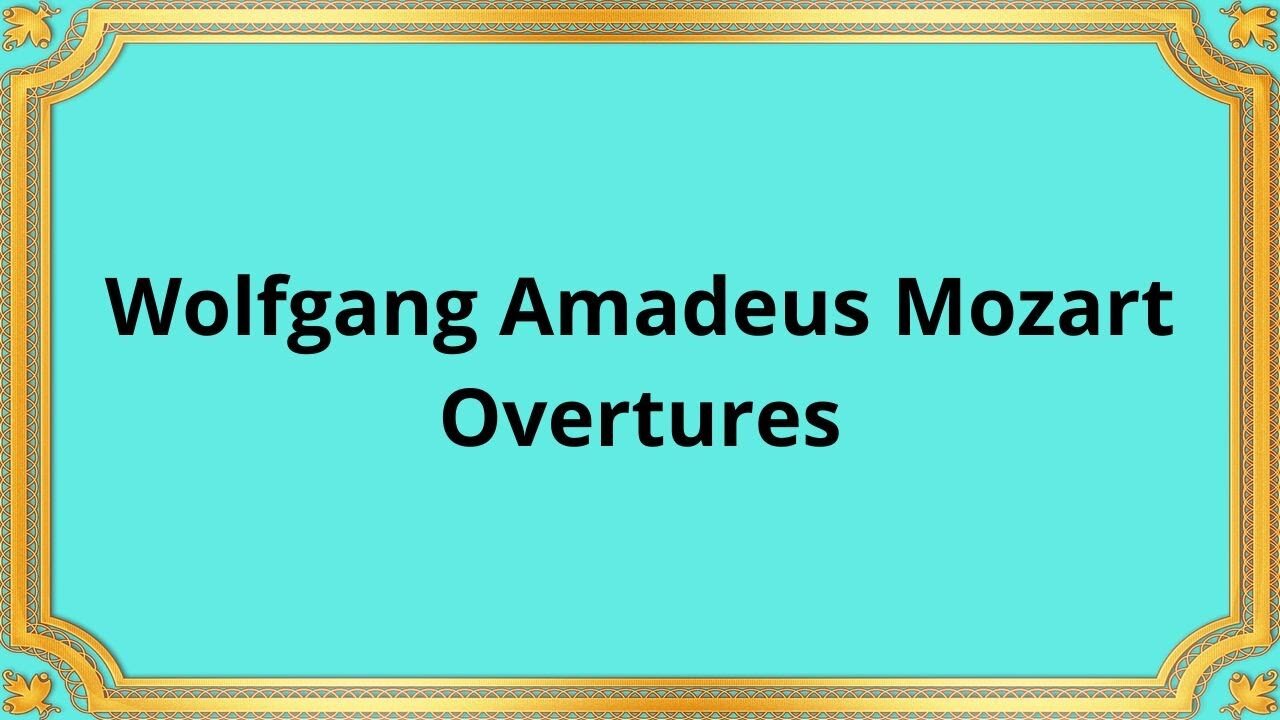Premium Only Content

Wolfgang Amadeus Mozart Overtures
#classicalmusic #Mozart #chambermusic #overture #Mozart #Overtures #ClassicalMusic #DonGiovanni #IISeraglio #Figaro #Titus #Impressario #Idomeneo #MagicFlute #Composer #MusicComposition #ClassicalComposers #Opera #Musician
Publication date 1959
Hamburg Pro Musica :
Conducted by Harry Newstone
1. Don Giovanni 00:00
2. II Seraglio 06:17
3. Figaro 11:54
4. Titus 16:12
5. Impressario 20:13
6. Idomeneo 25:12
7. Magic Flute 29:39
Wolfgang Amadeus Mozart, a legendary composer of the classical era, left an indelible mark on the world of music with his exquisite compositions. Among his vast repertoire, Mozart's overtures hold a special place.
1. "Don Giovanni":
Mozart's overture for "Don Giovanni" captivates listeners from the very first note. It sets the stage for the dramatic opera that follows, introducing themes and motifs that will reappear throughout the entire work. The overture begins with a foreboding and mysterious introduction, gradually building tension and showcasing Mozart's remarkable ability to create musical suspense. It then transitions into a lively and energetic section, representing the essence of the opera's dramatic and passionate storyline.
2. "II Seraglio":
The overture of "II Seraglio" is a vibrant and lively composition that reflects the opera's exotic setting and light-hearted nature. It opens with a spirited and joyful melody, characterized by intricate woodwind passages and sparkling orchestration. The overture showcases Mozart's ability to infuse his music with a sense of playfulness and charm, setting the tone for the comedic elements that unfold in the opera.
3. "Figaro":
Mozart's overture for "Figaro" is a true masterpiece, serving as a microcosm of the opera's rich tapestry of emotions and intricate storytelling. It begins with a captivating and energetic theme, drawing listeners into the world of the opera. The overture seamlessly weaves together contrasting melodies, showcasing Mozart's mastery of orchestration and his ability to evoke a range of emotions, from joy and excitement to tenderness and longing.
4. "Titus":
The overture of "Titus" is a beautiful and introspective composition that reflects the opera's themes of loyalty, forgiveness, and the complexities of power. It opens with a solemn and contemplative melody, evoking a sense of introspection and emotional depth. As the overture progresses, it transitions into more lively and spirited sections, showcasing Mozart's ability to convey a wide range of emotions within a single musical piece.
5. "Impressario":
Mozart's overture for "Impressario" is a delightful and light-hearted composition that captures the essence of the opera's comedic elements and theatricality. It begins with a lively and spirited introduction, setting the stage for the opera's farcical plot. The overture showcases Mozart's knack for crafting catchy melodies and incorporating delightful surprises, leaving audiences charmed and entertained.
6. "Idomeneo":
The overture of "Idomeneo" is a grand and majestic composition that befits the opera's dramatic and heroic storyline. It opens with a powerful and triumphant theme, transporting listeners to the world of Greek mythology and the struggles of the eponymous hero. The overture displays Mozart's ability to create a sense of grandeur and emotional intensity, capturing the essence of the opera's epic themes.
7. "Magic Flute":
Mozart's overture for "Magic Flute" is a true masterpiece, embodying the enchanting and mystical nature of the opera. It begins with a gentle and mysterious introduction, gradually building in intensity and showcasing Mozart's ability to create musical tension. The overture features a wide range of musical styles and emotions, from tender and lyrical passages to energetic and lively sections, reflecting the opera's fantastical and whimsical elements.
Conclusion:
The overtures of Wolfgang Amadeus Mozart, including those of "Don Giovanni," "II Seraglio," "Figaro," "Titus," "Impressario," "Idomeneo," and "Magic Flute," stand as testament to the composer's genius and his ability to create captivating and emotionally rich musical works. These overtures serve as a gateway to the operas they introduce, setting the stage for the captivating stories and intricate melodies that unfold within. Mozart's unparalleled talent for crafting compelling and evocative music shines brilliantly in these overtures, leaving a timeless legacy in the world of classical music.
You have the opportunity to support the channel:
https://destream.net/live/RadSiarAl/donate
https://www.buymeacoffee.com/6355radsiaral
-
 32:30
32:30
Classical music_Music Inspiration
16 days agoArturo Toscanini Grand Canyon Suite
521 -
 53:32
53:32
Kimberly Guilfoyle
2 hours agoThe Fight for Accountability, Live with Martha Byrne & Daniel Turner | Ep227
19.8K3 -
 LIVE
LIVE
The Officer Tatum
2 hours agoLIVE: Elon Musk DROPS BOMB On Donald Trump + MORE | EP 118
1,223 watching -
 1:46:26
1:46:26
Roseanne Barr
2 hours agoDon't Let Commies Split Maga W/ James Lindsay | The Roseanne Barr Podcast #102
39.8K14 -
 1:20:08
1:20:08
Untamed Nation
1 hour agoIS THE BROMANCE DEAD?? BIG BEAUTIFUL BILL MELTDOWN | 5 JUNE 2025
11.9K -
 DVR
DVR
freecastle
6 hours agoTAKE UP YOUR CROSS- RESTORING ORDER AT OUR SOUTHERN BORDER
3.62K6 -
 LIVE
LIVE
Tommy's Podcast
1 hour agoFallout Cast | James Kunstler, Dave Collum, Tom Luongo (TPC #1,762)
632 watching -
 1:41:42
1:41:42
vivafrei
6 hours agoJailed for a Tweet! The U.K.'s Descent Into TYRANNY! Covid Talk With Jessica Rose & MORE!
76.4K27 -
 16:38
16:38
Silver Dragons
2 hours agoEMERGENCY VIDEO - Silver Price Hits 13 Year High! (DO THIS NOW)
10K2 -
 15:45
15:45
T-SPLY
6 hours agoWorcester Councilwoman Charged with Assaulting Officers During DHS Raid!
8.71K5